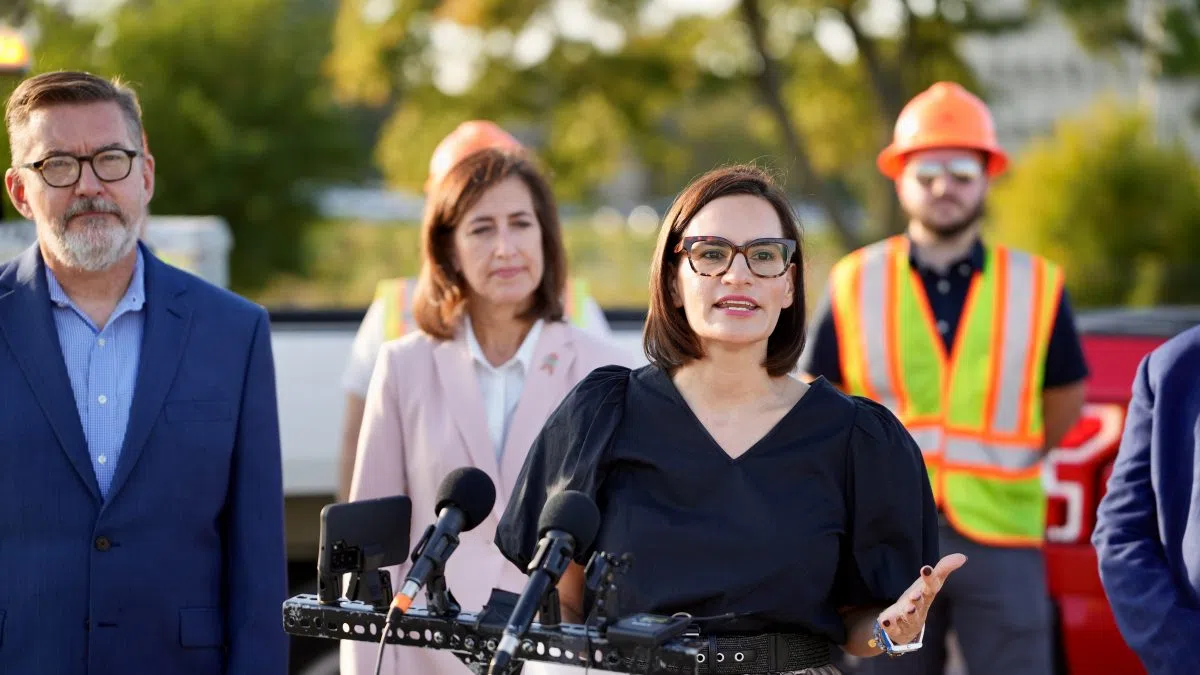Hipkins was welcomed to Pukaha with a pōwhiri at the marae and toured the facility and some of the reserve.
While there, the Bush Telegraph asked Hipkins questions around the recent flooding in Pahīatua and on rural health.
He said what happened in Pahīatua, where several streets were flooded following a weekend of heavy rain, was symptomatic of problems around the country.
“Councils don’t have the capital behind them that they need to fix the infrastructure.”
Hipkins said that while in Government, they wanted to sit down with councils and go through a report produced by councils on the future of local government.
“Central and local government need to sit down together, and this is what we will do [to] work out a more sustainable funding approach for local government.”
He said their Affordable Water Reform was about how they could fix the water infrastructure in the most affordable way possible.
“That was still a much more affordable approach than the one the current Government are pursuing.”
On rural health, Hipkins said before the last election they had outlined a plan to ramp up the two medical schools to train more doctors as fast as possible, and added that building a new medical school would take years.
In terms of attracting doctors to rural areas, he said that Health New Zealand Te Whatu Ora needed to look at the overall package.
“Our hospitals and our schools used to be much more in the business of providing housing for teachers and doctors and nurses, in order to get them to live in communities where it is otherwise difficult to recruit those positions.
“We don’t do as much of that now and those are the things that, we need to look at it again.”
Wairarapa MP Mike Butterick was also given the opportunity to respond.
He said the cost of infrastructure was a big issue for councils across the country.
“Provision of drinking, storm and wastewater is costly but necessary and our infrastructure is under pressure from lack of investment,” Butterick said.
The problem of ageing infrastructure was not new but he said the Government’s Local Water Done Well would bring managed, affordable change for communities while keeping assets in their hands.
“The smaller rating bases of small towns in rural areas like those in the Wairarapa have been under pressure for some time.
“I know there will be relief as delivery of Local Water Done Well begins.”
Butterick said it would allow access to long-term borrowing as well as a clear steer on financial sustainability to make sure council debt remained affordable for communities.
On the flooding, he said his thoughts went out to those residents and businesses affected and it was good to see teams from Tararua District Council out knocking on doors and dispatching roading crews.
“Current modelling is telling us to expect greater frequency and severity of storms and that’s something that we need to plan for.
“While Pahīatua’s drains are designed and managed for a one-in-five-year flood level, we may well see more of the one-in-30-year levels that caused the recent localised flooding.”
On rural health, Butterick said attracting and retaining health staff was a real issue in the regions and it was important to have a solution that worked for communities.
“I’ve been working with Tū Hauoranga Trust in Wairarapa as they look to develop and implement sustainability for our health workforce.
“There’s a clear understanding among local health professionals that, alongside attracting qualified staff, we need to work hard to make them feel welcome and assist them, and their families, to feel a sense of belonging.”
He said while the work was under way in Wairarapa, the information and actions will be transferable into the Tararua and Central Hawke’s Bay communities.
“I know that our local health centres have been proactive and solutions-focused in delivering services while under pressure.
“I was pleased to learn at a Wairarapa Rural Health forum last weekend that our region leads the way in New Zealand with the number of nurse prescribers per head of population.”
Butterick said the Government was looking to improve and grow the training of GPs in rural areas, including through the proposed University of Waikato medical school.
He said they had also funded an additional 25 medical schools training places in this year’s Budget to grow the number of New Zealand trained doctors.
“Increasing the size of New Zealand’s health workforce will result from a combination of approaches and we need to ensure our doctors have support from the beginning to the end of their learning journey.”




